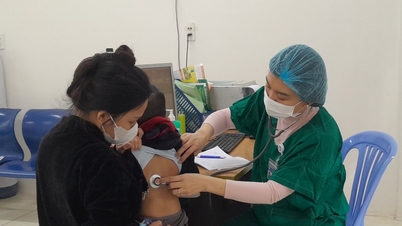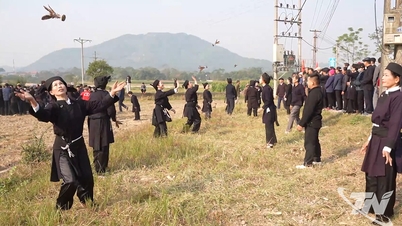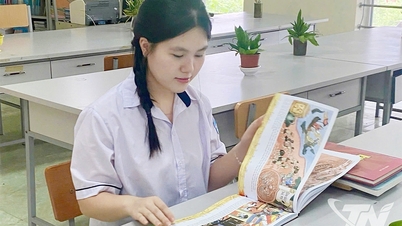Influenza is one of the most common respiratory infections, especially during the flu season. Although influenza is not usually dangerous for adults, for children, especially those under 5 years old, influenza can lead to many dangerous complications, even life-threatening if not treated promptly.
Influenza is one of the most common respiratory infections, especially during the flu season. Although influenza is not usually dangerous for adults, for children, especially those under 5 years old, influenza can lead to many dangerous complications, even life-threatening if not treated promptly.
Children's immune systems are not fully developed and are not yet able to fight many types of bacteria and viruses that cause disease, including influenza viruses.
 |
| Influenza is one of the most common respiratory infections, especially during epidemic seasons. |
When a child is infected with the flu, the body is not strong enough to destroy the virus quickly and effectively. This creates an opportunity for the virus to thrive, causing serious complications.
In addition, children are often susceptible to environmental factors such as changing weather, inadequate nutrition, or not being fully vaccinated, increasing the risk of flu and its complications.
Pneumonia is one of the most dangerous complications of the flu. When the flu virus attacks a child's respiratory system, it can cause pneumonia, leading to difficulty breathing, wheezing, severe coughing, and a high fever that won't go away. Pneumonia caused by the flu can require hospitalization and treatment in an intensive care setting.
The flu virus can spread from the nose and throat to the ears, leading to otitis media. This can cause earache, fever, and if not treated promptly, can lead to long-term infection and affect the child's hearing.
Especially for children with weak respiratory systems such as infants or children with underlying medical conditions such as asthma, flu can cause acute respiratory failure. Children will have difficulty breathing and may need ventilator support or oxygen.
Children with the flu often have symptoms of high fever, severe cough, vomiting, diarrhea, leading to severe dehydration. Dehydration will worsen the child's health condition, making treatment more difficult.
This is a rare but very dangerous complication when children have the flu, especially when they use aspirin incorrectly. Reye's syndrome can cause liver and brain damage, leading to coma, seizures and even death if not treated promptly.
A small number of children with the flu may develop myocarditis, an inflammation of the heart muscle caused by the virus. Myocarditis can cause chest pain, difficulty breathing, and an irregular heartbeat, which can be life-threatening.
Flu can also affect a child's nervous system, causing problems such as encephalitis, high fever, convulsions, and delirium. This is a rare but very dangerous complication that can leave long-term consequences if not treated promptly.
Recently, the National Children's Hospital has received many cases of children admitted with symptoms of cough and fever, which seemed like common flu but actually had serious complications.
One of them is the case of an 8-year-old girl in Nghe An who was hospitalized with symptoms of fatigue and chest pain. After diagnosis, the doctor confirmed that the girl had mild myocarditis - a dangerous complication of the flu.
Doctors warn that many families are often subjective, thinking that the flu is not serious and delay early treatment, leading to unpredictable complications.
To prevent the flu, getting a flu vaccine is the most effective preventive measure. Dr. Chu Thi An, Safpo/Potec Vaccination System, said that the flu vaccine helps the body create antibodies against the flu virus, reducing the risk of getting sick and reducing the risk of serious complications. Parents should vaccinate their children according to the regular vaccination schedule and follow the doctor's instructions.
In addition, children should be regularly washed with soap and clean water, especially before eating and after using the toilet. At the same time, keep the child's living environment clean and airy to prevent the development of flu viruses.
Nutrition plays an important role in strengthening children's resistance. Supplementing enough vitamin C, vitamin D, and essential nutrients will help children have a healthy immune system and be ready to fight disease.
When the weather changes, especially in winter or during the changing seasons, it is necessary to keep children warm and limit their contact with people with the flu or environments that are susceptible to infection.
If your child has flu symptoms such as high fever, cough, sore throat, runny nose, or unusual signs (difficulty breathing, excessive fatigue), parents should take their child to the doctor for examination and timely treatment. Early treatment will help prevent dangerous complications.
Influenza is a highly contagious disease and can cause many serious complications in children if not detected and treated promptly.
Preventing influenza and its complications is not just about vaccination, but also a comprehensive health protection process that includes nutrition, hygiene and regular health monitoring. Parents need to have a clear understanding of influenza information and proactively care for and protect their children to help them have a healthy winter.
According to estimates from the US Centers for Disease Control and Prevention (CDC), each year the world records between 290,000 and 650,000 deaths due to influenza. Of these, about 28,000 children under 18 years of age die from complications of lower respiratory tract infections, mainly children under 4 years of age.
The World Health Organization (WHO) also said that every year about 5-10% of adults and 20-30% of children get influenza A or B. The rate of influenza in children is higher than that in adults. This is an issue that needs special attention because children's immune systems are still weak, making them vulnerable to disease.
Source: https://baodautu.vn/tre-mac-cum-de-gap-nhieu-bien-chung-nguy-hiem-d231968.html






![[Photo] National Assembly Chairman Tran Thanh Man receives First Vice Chairman of the Federation Council of the Federal Assembly of the Russian Federation](/_next/image?url=https%3A%2F%2Fvphoto.vietnam.vn%2Fthumb%2F1200x675%2Fvietnam%2Fresource%2FIMAGE%2F2025%2F12%2F02%2F1764648408509_ndo_br_bnd-8452-jpg.webp&w=3840&q=75)









































































![[Photo] General Secretary To Lam and his wife attend the 50th Anniversary of Laos National Day](https://vphoto.vietnam.vn/thumb/402x226/vietnam/resource/IMAGE/2025/12/02/1764644139308_1.jpeg)






























Comment (0)